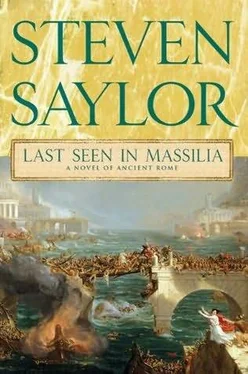Steven Saylor - Last seen in Massilia
Здесь есть возможность читать онлайн «Steven Saylor - Last seen in Massilia» весь текст электронной книги совершенно бесплатно (целиком полную версию без сокращений). В некоторых случаях можно слушать аудио, скачать через торрент в формате fb2 и присутствует краткое содержание. Жанр: Исторический детектив, на английском языке. Описание произведения, (предисловие) а так же отзывы посетителей доступны на портале библиотеки ЛибКат.
- Название:Last seen in Massilia
- Автор:
- Жанр:
- Год:неизвестен
- ISBN:нет данных
- Рейтинг книги:3 / 5. Голосов: 1
-
Избранное:Добавить в избранное
- Отзывы:
-
Ваша оценка:
- 60
- 1
- 2
- 3
- 4
- 5
Last seen in Massilia: краткое содержание, описание и аннотация
Предлагаем к чтению аннотацию, описание, краткое содержание или предисловие (зависит от того, что написал сам автор книги «Last seen in Massilia»). Если вы не нашли необходимую информацию о книге — напишите в комментариях, мы постараемся отыскать её.
Last seen in Massilia — читать онлайн бесплатно полную книгу (весь текст) целиком
Ниже представлен текст книги, разбитый по страницам. Система сохранения места последней прочитанной страницы, позволяет с удобством читать онлайн бесплатно книгу «Last seen in Massilia», без необходимости каждый раз заново искать на чём Вы остановились. Поставьте закладку, и сможете в любой момент перейти на страницу, на которой закончили чтение.
Интервал:
Закладка:
"But despite Pompey's message," he went on, "I still had my
* See Rubicon (St. Martin's Press, 1999).
suspicions about your oh-so-clever son. Milo warned me. You must remember Titus Annius Milo, exiled a few years back for murdering Clodius on the Appian Way?"
"Of course. I investigated the matter for Pompey."
"So you did! I'd forgotten that. Did you somehow… offend… Milo?"
"Not to my knowledge."
"No? Well, for whatever reason, I'm afraid Milo wasn't fond of your son. Suspected him right off. `The boy's no good,' he told me. I might have paid Milo no mind-when was Milo ever known for sound judgment? — but he echoed my own instincts. I continued to watch your son very closely. Even so, I could never quite catch him at anything. Until…"
Domitius turned his head and gazed at the view, sipping his wine in silence for so long that he seemed to have forgotten his thought.
"Until what?" I finally said, trying to keep my voice steady. "Do you know-I think Milo himself should tell you. Yes, I believe that would be best. We'll go and see him right now. We can gloat about what a fine meal we've just had, while Milo dines on stale bread and the last of the fish-pickle sauce he brought from Rome."
When I first met him at Cicero's house months ago, I had decided that Domitius was a pompous, vain creature. Now I saw that he was also petty and spiteful. He seemed to relish my distress.
We bade the scapegoat farewell. Hieronymus invited Davus and I to return later to sleep under his roof that night. Even as I promised that we would, I wondered if I lied. Just because I had escaped death twice already that day, there was no reason to think it might not come for me yet.
Had death come already for Meto? Domitius had so far refused to tell me, but I kept thinking of his words: Milo wasn't fond of your son. Why he had spoken in the past tense?
IX
The way to Milo's house took us through a district of large, fine houses. More than a few, I was surprised to see, had thatched roofs-a reminder that we were not in Rome, where even the poor sleep with clay tiles over their heads.
The moon was so bright that we made our way without torches. The only sound was the tramping of Domitius's bodyguards on the paving stones. The narrow streets of Massilia, almost empty by daylight, were even more deserted after dark. "Martial law," Domitius explained. "A strict curfew. Only those on state business can be abroad after nightfall. Anyone else is presumed to be up to no good."
"Spies?" I said.
He snorted. "Thieves and black marketeers, more likely. Apollonides's greatest fear now isn't Trebonius with his tunnels and battering-rams; it's famine and disease. We're already feeling the shortages. As long as the blockade holds, the situation can only get worse. If the people become hungry enough, they're likely
to break into the public granaries. Then they'll discover just how bad the situation really is. The Timouchoi fear an uprising."
"The authorities didn't stockpile enough grain for a siege?"
"Oh, quantity isn't the problem. There's a full store of grain-but half of it is ruined with mold. Emergency stores have to be replaced every so often; once every three years is the rule in most cities. Apollonides can't even tell me when the stores were last replenished. The Council of Fifteen thought it was a wasteful expense. Now their niggardliness has gotten the better of them, and my men are reduced to half rations."
Domitius had left Italy with six million sesterces, I recalled; money enough to sail to Massilia and hire an army of Gaulish mercenaries once he arrived, with plenty left over. But no amount of riches could feed an army if there was no food to be purchased.
"Don't misunderstand me," he continued. "Apollonides is a good man, and he's not a bad general. He knows everything there is to know about ships and war machines. But like all Massilians, he's a merchant at heart, forever calculating and looking for a profit. These Greeks are clever, but they have a narrow view of things. They're not like us Romans. There's a fire they lack, a bigger way of looking at the world. They'll never be more than minor players in the great game."
"Does Apollonides have children?" I asked. I was remembering the way he had abruptly softened when I explained that I had come to Massilia seeking my son.
"Of course. No man can join the Timouchoi unless he has offspring."
"Ah, yes. The scapegoat explained that to me."
"But in Apollonides's case, it's a bit of a delicate subject. You'll see. Or not see, rather." He smiled at a secret joke.
"I don't understand."
"Apollonides has only one child, a daughter named Cydimache. Her ugliness is legendary. Well, she's more than ugly; a monster, really. Hideous. Born with a harelip and her face all misshapen, like a lump of melted wax. Blind in one eye and has a hump on her back."
"Babies like that are usually exposed at birth," I said. "Discreetly gotten rid of."
"Indeed. But Apollonides's wife had already miscarried twice, and he was desperate to become a Timouchos, and for that he needed offspring. So he kept Cydimache and got himself elected to the next opening among the Timouchoi."
"He had no more children?"
"No. Some say his wife's labor with Cydimache left her barren. Others say that Apollonides himself was too afraid of fathering another monster. At any rate, his wife died a few years ago, and Apollonides never remarried. Despite her deformities, they say that Apollonides genuinely loves his daughter, as much as any father could."
"You've seen her?"
"Apollonides doesn't hide her away. She rarely goes out, but she dines with his guests. She hides her face with veils and rarely speaks. When she does, her voice is slurred, on account of her harelip I suppose. I did get a glimpse of her face once. I was crossing the garden of Apollonides's house. Cydimache had paused at a rose bush. She'd pulled aside her veils to smell a bloom, and I surprised her. Her face was a sight to stop a man's heart."
"Or break it, I should think."
"No, Finder. Beauty breaks a man's heart, not ugliness!" Domitius laughed. "I'll tell you this: The face of Cydimache is not a sight I ever care to see again. I don't know which of us was more unnerved. The girl fled, and so did I." He shook his head. "Who'd have thought such a creature would ever find a husband?"
"She's married?"
"The wedding took place just before I arrived in Massilia. The young man's name is Zeno. Quite a contrast to his wife; damned good-looking, in fact. Not that my taste runs to boys-although
faced with a choice of Zeno or Cydimache…!" He laughed. "Some people claim it was a love match, but I think that's just these Massilians' sense of humor. Zeno comes from a modest but respectable family; he married her for money and position, of course. This is his means to become a Timouchos-if he can manage to get Cydimache with child."
"Apollonides was satisfied with the match?"
"I don't suppose many young men with prospects were lining up to woo the monster, not even to become the son-in-law of the First Timouchos." Domitius shrugged. "The match seems to have worked. Zeno and Cydimache sit at Apollonides's right hand every night at dinner. The young man treats her with great deference. Sometimes they talk in low voices and laugh quietly among themselves. If you didn't know what was under the veils"-he made a face and shuddered-"you might think they were as love-struck as any other pair of newlyweds."
A Gaulish slave girl with braided blond hair answered the door at Milo's house. She was scantily clad even for such a warm night. Her Greek was poor and atrociously accented, but it was obvious she had not been purchased for her language skills. She giggled incessantly as she invited Domitius, Davus, and myself into the foyer. The only light was the lamp she held in her hand; outside the scapegoat's house, fuel, like food, was severely rationed in Massilia. The oil was of low quality. The rancid-smelling smoke at least helped to cover the odor of unwashed humanity that permeated the house. Instead of running to fetch her master, the girl simply turned and yelled for him.
Читать дальшеИнтервал:
Закладка:
Похожие книги на «Last seen in Massilia»
Представляем Вашему вниманию похожие книги на «Last seen in Massilia» списком для выбора. Мы отобрали схожую по названию и смыслу литературу в надежде предоставить читателям больше вариантов отыскать новые, интересные, ещё непрочитанные произведения.
Обсуждение, отзывы о книге «Last seen in Massilia» и просто собственные мнения читателей. Оставьте ваши комментарии, напишите, что Вы думаете о произведении, его смысле или главных героях. Укажите что конкретно понравилось, а что нет, и почему Вы так считаете.










